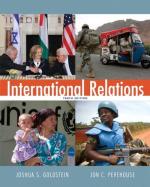|
This section contains 3,601 words (approx. 13 pages at 300 words per page) |

|
The term "international relations"—subsuming "international affairs" and "foreign affairs"—refers to interactions among nation states, and includes such diverse topics as international law, international trade, and the international monetary system. Although international corporations and non-governmental organizations influence these interactions, and international bodies such as the United Nations help manage them, the primary actors remain nation states. Insofar as nations carry and articulate values, and find their powers conditioned by changes in science and technology (from military effectiveness and productivity to means of communication and bureaucratic organization), international relations also function as an important site for science, technology, and ethics interactions.
Historical Transformations
Following the Peace of Wespthalia (1648) and acceptance of the nation state as the sovereign arbiter of values and power within its borders, questions arose about how to manage interstate relations. The assumption, shared more by theorists than political leaders, from the seventeenth through...
|
This section contains 3,601 words (approx. 13 pages at 300 words per page) |

|


